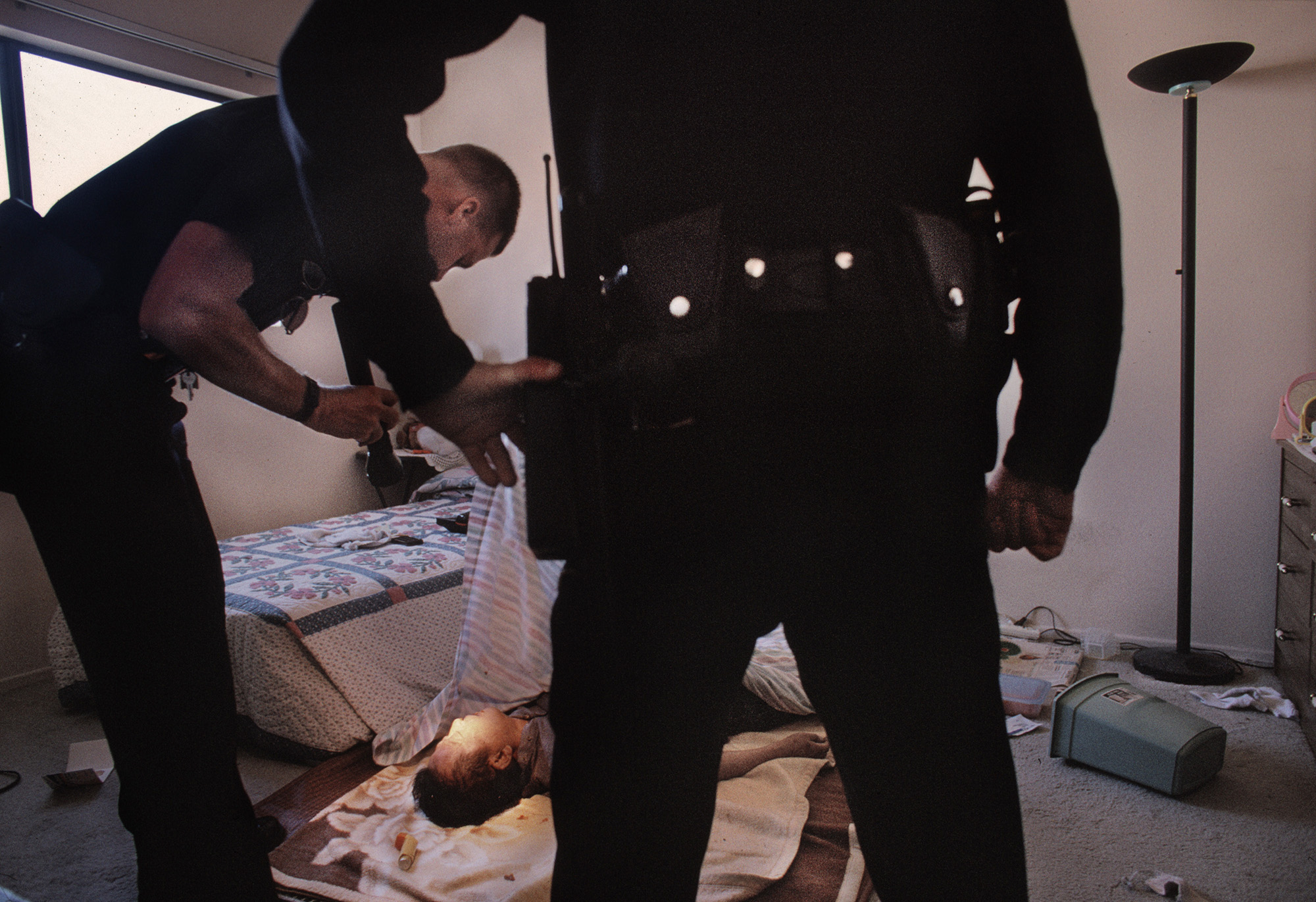A gripping portrait of the LAPD in the 1990s
- Text by Miss Rosen
- Photography by Joseph Rodriguez

Rife with systemic abuses of power, the Los Angeles Police Department’s brutalization of Black and Latinx communities came to a head when four cops charged with assaulting Rodney King were found not guilty in April 1992, sparking off the LA Riots.
That June, Willie Williams became the first Black Chief of the LAPD after Daryl Gates was forced to resign. Recognizing the power of publicity, Williams gave the New York Times Magazine unprecedented access to the LAPD in an effort to sell the public “A Kinder Gentler Cop.”
In September 1994, the Times commissioned photographer Joseph Rodriguez to ride along with members of the LAPD across the city and around the clock over a period of two weeks. A native New Yorker, Rodriguez had been in Los Angeles for two years working on a project that would become East Side Stories: Gang Life in East LA (powerHouse Books, 1998).

Rampart Division officer responds to a shooting. A man bleeding on the floor claims that he was shot in his home by a gang member.
“It was an eye-opener,” Rodriguez says of his time with law enforcement, which has been compiled in the forthcoming book, LAPD 1994 (The Artist Edition), a photographic expose of his time with members of the Community Resources Against Street Hoodlums (CRASH) unit, the subject of the 1988 film Colors, the Rampart Division, and the 77th Street Division in South Central and Watts.
“It was still the era when babies were being shot and there were gangs all over the city. [The LAPD] were like another gang to me. However, this is a hard job. We covered murder and a lot of domestic violence. When you look at all these photographs and see what they have to do on a daily basis, it does jade you.”

Los Angeles police officers (Rampart division) are feeling the heat from all sides: from the mayor, from their superiors and from citizens like this man, who was assaulted by gang members and complained about the lack of police protection. This is the original caption that ran in NYT Magazine January 22,1995

Officer Hoskins responds to a car accident, truck has turned over to its side and driver and passenger were locked in. Hoskins tries to pry the door open.
On the street, things happened fast. Rodriguez focused on the lessons of famed photojournalist Weegee to get in the middle of the action and make the picture. “But shooting in color on Kodachrome with flash at night — I can’t begin to tell you how hard that was. It’s hit or miss,” he says with a wry laugh.
Covering criminal justice throughout his career, Rodriguez brings a profound sense of empathy to the work, which is rooted in the early experiences of his life. “These were people I grew up with in terms of the chaos,” he says.
“I know what it was like to be in the back seat of a police car in handcuffs. I’ve been there. I went to Rikers Island two times. When you see the homeless addict, I know what that is. I think about my mother, my stepfather who was a junkie, the shit we went through as kids.
After completing the assignment and returning to New York, Rodriguez experienced a bout of PTSD. “I was a nervous wreck. I went really deep. East Side Stories and LAPD was the same: you embed yourself into this world with all this ugliness because you know that some day this work may be important. That someday is now.”

Rampart officers search an abandoned motel for a murder suspect. The building is just a few blocks from Charlie Chaplin’s old mansion.

Officer Edwards inspects the body of a Korean man choked to death.

A young man received a ticket for jaywalking.

Murder suspect is arrested as his family watches.

Officer on patrol at an abandonned house looking for squatters and drugs, Venice Beach.
LAPD 1994 will be published September 30 through The Artist Edition.
Follow Miss Rosen on Twitter.
Enjoyed this article? Like Huck on Facebook or follow us on Twitter.
Latest on Huck

Clubbing is good for your health, according to neuroscientists
We Become One — A new documentary explores the positive effects that dance music and shared musical experiences can have on the human brain.
Written by: Zahra Onsori

In England’s rural north, skateboarding is femme
Zine scene — A new project from visual artist Juliet Klottrup, ‘Skate Like a Lass’, spotlights the FLINTA+ collectives who are redefining what it means to be a skater.
Written by: Zahra Onsori

Donald Trump says that “everything is computer” – does he have a point?
Huck’s March dispatch — As AI creeps increasingly into our daily lives and our attention spans are lost to social media content, newsletter columnist Emma Garland unpicks the US President’s eyebrow-raising turn of phrase at a White House car show.
Written by: Emma Garland

How the ’70s radicalised the landscape of photography
The ’70s Lens — Half a century ago, visionary photographers including Nan Goldin, Joel Meyerowitz and Larry Sultan pushed the envelope of what was possible in image-making, blurring the boundaries between high and low art. A new exhibition revisits the era.
Written by: Miss Rosen

The inner-city riding club serving Newcastle’s youth
Stepney Western — Harry Lawson’s new experimental documentary sets up a Western film in the English North East, by focusing on a stables that also functions as a charity for disadvantaged young people.
Written by: Isaac Muk

The British intimacy of ‘the afters’
Not Going Home — In 1998, photographer Mischa Haller travelled to nightclubs just as their doors were shutting and dancers streamed out onto the streets, capturing the country’s partying youth in the early morning haze.
Written by: Ella Glossop